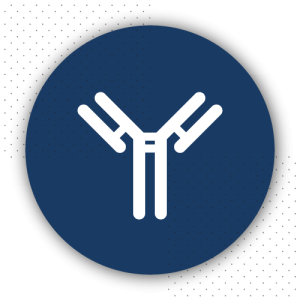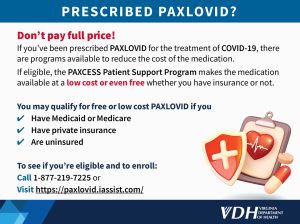
Protect Your Health
COVID-19 Treatment
Most people with mild or moderate COVID-19 can recover using at-home over-the-counter treatments like acetaminophen (Tylenol) or ibuprofen (Motrin). However, some people with COVID-19 may benefit from treatments prescribed by a healthcare provider. Currently available treatments are Paxlovid, Veklury, and Lagevrio.
Who is eligible for COVID-19 treatment?
People who are at increased risk for severe illness from COVID-19 [Español] can receive treatment for COVID-19. This includes :
- Adults aged 50 and older
- People who are unvaccinated or are not up to date on their COVID-19 vaccines
- People with certain health conditions (lung disease, heart disease, asthma, current and former smokers)
- People who live in congregate settings (nursing homes, long term care settings)
- People with a weakened immune system
Summary Table of COVID-19 Treatments
| Drug | How is it given? | When should I take it? | Cost for You | Cost for You |
| Paxlovid (Nirmatrelvir co-packaged with Ritonavir) In most patients this is the preferred treatment | Three tablets by mouth twice a day for 5 days for people with normal kidney function. For people with moderate kidney disease, the dose is lower. Contact your healthcare provider. | Within 5 days of symptoms starting | Typically no cost but potential fees may apply for medication and or visit | No cost for medication, potential fees for your evaluation |
| Veklury (Remdesivir) In most patients, this is the second-line preferred treatment | IV (given into your vein) for 3 days in a row | Within 7 days of symptoms starting | There IS a cost for the medication, potential fees for your evaluation and the drug administration | There IS a cost for the medication, potential fees for your evaluation and the drug administration |
| Lagevrio (Molnupiravir) Recommended when you cannot take a preferred treatment | Four capsules by mouth twice a day for 5 days | Within 5 days of symptoms starting | Typically no cost but potential fees may apply for medication and or visit | No cost for medication, potential fees for your evaluation |
Treatments for hospitalized COVID-19 patients
Getting COVID-19 Treatment
If you have COVID-19 or symptoms and are at increased risk of severe illness, you should contact your health care provider right away regardless of how mild your symptoms are.
Treatments are only available by prescription and work best when you start them within 5 days after symptoms start so don’t delay.
If you don’t have a healthcare provider, the resources below are available to help you access COVID-19 medical care and treatment:
- COVID-19 Treatment Locator – Treatments available at most pharmacies
- Virginia Association of Free and Charitable Clinics – Free clinics in Virginia
- Virginia Community Healthcare Association – Clinic finder – Federally qualified health centers in Virginia
- VDH Health Department Locator Tool
Cost of Treatment
Patients may not have to pay for the medication itself, but there may be other fees associated with getting the treatment. Call ahead to your healthcare provider and insurance company to find out how much you may have to pay.
Patient assistance programs are available to help lower out-of-pocket costs:
What if I’m not eligible for COVID-19 treatment?
If you have been diagnosed with COVID-19 and you are not at increased-risk for severe illness, your healthcare provider may recommend other treatments to help you feel better and help your body fight the virus. Some examples of things to consider include:
- Drink plenty of liquids with no caffeine to stay hydrated
- Get plenty of rest
- Take medications like acetaminophen (Tylenol) or ibuprofen (Motrin) may help to reduce fever
Benefits of vaccination compared to treatments
Vaccination remains the most important tool to control the spread of and prevent COVID-19. Vaccines are free, safe, and widely available to everyone aged 6 months and older. Vaccines have been shown to be effective against newer variants of COVID-19, including Omicron. To learn more about COVID-19 vaccination, visit the VDH COVID-19 Vaccination Website.
Learn more
Resources for more information
VDH COVID-19 Treatment Information Sheet , Spanish
CDC: COVID-19 Treatments and Medications
HHS: COVID-19 Treatment Information for Patients
FDA: Know Your Treatment Options
Resources about specific COVID-19 therapeutics currently authorized or approved by the FDA:
Opens pdf to download
Opens in a new window
External link will open in a new window. Click link to exit Virginia Department of Health Website.
Page last updated: July 19, 2024

